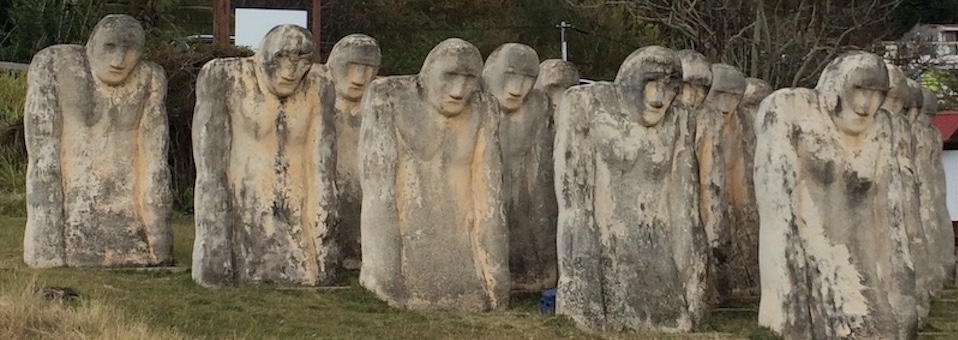
Decolonizing the Memories of Slavery
7-9 December, 2021 - Schoelcher (France)
Call of papers
INTERNATIONAL CONFERENCE Decolonising the Memories of Enslavement Université des Antilles et Le Mans Université 7 – 8 – 9 December 2021 Schoelcher, Martinique
The issues of discrimination and racism are more than ever at the heart of today’s debates in Europe, America and Africa. The killing of George Floyd by police officers in Minneapolis has once again and in an abrupt way revealed the deadly consequences of structural racism questioned by the « Black Lives Matter » movement. Demonstrations were organised to demand a re-reading of History through such symbols as statues representing historical figures with a link to the past of slavery in the USA, Canada, Great Britain, France, Martinique, Guadeloupe, Barbados, Trinidad and Tobago, Reunion Island, South Africa or Senegal. Hence, it becomes obvious that the weight of the past still overwhelms the present, that ideologies and prejudices are still passed down through time and generations and maintained by racialist groups like the Ku Klux Klan. Despite all the struggles which led to the abolition of slavery, despite the fights for Civil Rights and Human Rights, intersectional oppressions remain and the struggle for equality and justice must continue. The work of memory has been carried forward but the fundamental question is to know whether it succeeds in changing societies and pushing mentalities towards more equity and respect for human beings whatever their skin colour. This is precisely what Achille Mbembe expresses as he fully advocates for Fanon’s proposal for a rise of humanity in Black Skin, White Masks. In the epilogue to his Critique of Black Reason, Mbembe invites us to connect our differences, to expand our conceptions of justice and responsibility, and to let go of the burden of race. “There is only one world” Mbembe states, “in such conditions we create borders, build walls and fences, divide, classify, and make hierarchies. We try to exclude—from humanity itself— those who have been degraded, those whom we look down on or who do not look like us, those with whom we imagine never being able to get along. But there is only one world. We are all part of it, and we all have a right to it” (2017: 179-182). This conference invites contributors to envision this collective rise of humanity through the lenses of literary, artistic and sociocultural creations which will be explored in order to reconsider memorial spaces and the representations of traumatic sites. It proposes to address how the memories of slavery should be expressed and represented differently in the present day in order to decolonise minds and mentalities. This desire for decolonising culture transforms the English language and promotes self-conscious terms. Indeed, it is paramount to break with the colonial spirit which turned human beings into commodities in the accounts of the slave trade. One needs to change how the enslavement of the other is conceived in the minds by using terms which focus attention on the person (enslaved) whose right to freedom is withdrawn by a dehumanising system (enslavement) rather than on a status (slave). The agency of slave owners is also foregrounded by the term enslaver instead of master. While the translation of enslaved in French (esclavisé) is progressively used in most recent scholarship on enslavement in France, one may interrogate the extent to which this semantic shift is actually applied in French and in other languages such as Spanish. Decolonising the memories of enslavement would indeed consist in modifying accepted terminology as well as modes of thinking about the past and the place of individuals in History. How do arts and literature participate in changing the representations and commemorations of the past of enslavement? Which narrative or pictorial techniques can produce a rethinking of the dynamics of power and of a hegemonic culture which leaves very little space for the humanity of the ‘Other’? How do we highlight the complexities of memorial spaces and sites of trauma to pursue the process of cultural decolonising? How do we decolonise memories in the times of Internet and social networks? How do we undertake a duty of memory through the numerous media which are only reactive to immediacy? Our critical analysis should examine how writers and artists reinvent language and imagery in order to recover the subjectivity of human beings who were prisoners of the triangular trade system and enslavement. Paper proposals will address the possibilities of reinventing enslavement narratives through literary and artistic productions, but also the power of commemorations following the adoption of the Taubira law (May 23rd, 2001) which officially declared both the slave trade and enslavement as “crimes against humanity”. How do academics and teachers respond to Article 2 of Taubira law which states that “Academic and research programmes in History and Human Sciences will grant the slave trade and the history of enslavement the place they deserve”? This conference invites participants to analyse how the past of enslavement can become the subject of a shared memory beyond the stories of abolition.
Proposals for papers (350 words) + bio-biblio (150 words) should be submitted by email before March 30, 2021 to both: Myriam Moïse: myriam.moise@fulbrightmail.org Benaouda Lebdai: benaouda.lebdai@gmail.com
|
| Online user: 2 | Privacy |

|
